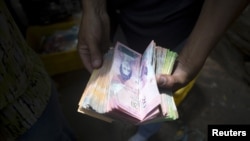A Portuguese immigrant to Venezuela who opened his shop in an industrial zone of Caracas 25 years ago stores wads of cash in a black bag each week then waits for the phone to ring.
When the call comes, a youth's voice checks he is ready to pay, and a motorbike swings by shortly after to pick up 5,000 bolivars for local gangsters.
The payment - worth nearly $800 at the government's strongest official exchange rate, though only $6 on the black market - ensures the gang does not attack his construction materials' store again as they did last year.
"I refused the first time they phoned and then early one Friday they shot at the outside of the business. Another day, they came by on a bike shooting at midday," he said. "Here, everyone pays. Anyone who says they don't is lying."
Extortion has increased in the last two years as crime gangs assert more control in the South American nation, according to official statistics and interviews with businessmen.
State prosecutors say they completed 215 investigations into extortion and kidnapping in 2014, more than twice as many as the year before, though law enforcement officials say they see only a fraction of the problem because extortion is rarely reported.
A survey by private monitoring group Venezuelan Violence Observatory this year found that 34 percent of those interviewed said extortion was "very present" where they lived, compared with 25 percent in 2013, the last time the poll was conducted.
"We live in a state of fear. Sometimes we call the police, but they don't even come," said Alberto Quintero, who owns a paint store in San Cristobal city near the Colombia border. He said he is threatened sporadically by gangs and forced to make payoffs, the last one 30,000 bolivares - more than four times the monthly minimum wage.
Extortion in Venezuela was for years concentrated mostly in that volatile western border region. But it is increasingly common in the capital too, adding to economic pressures forcing stores out of business, says the Caracas Chamber of Commerce.
"An alternative but illegitimate social order has been established in Caracas," said the chamber's executive director, Victor Maldonado. Twenty percent of the its members shut businesses last year due to recession and crime, including extortion.
Venezuela suffers one of the world's highest rates of violent crime, which critics of President Nicolas Maduro attribute to ineptitude and rampant corruption among police, state prosecutors and judges.
Anonymous Calls
Maduro blames security problems on right-wing Colombian paramilitary groups whom he says are in league with his political adversaries. One ruling Socialist Party official described extortion as a paramilitary practice.
The interior ministry declined to give further information on the practice when consulted by Reuters.
Business owners say they receive anonymous phone calls from individuals who identify themselves as having links to organized crime. The callers promise protection in exchange for payment and threaten violence against those who refuse.
"They always call me on Thursdays or Friday. I always tell them I'm ready," added the Portuguese immigrant, nervously checking to make sure nobody in the hallway of his store was listening. He asked that neither he nor his business be identified for fear of reprisals.
Businesses resort to creative accounting to justify the costs and pass them on to consumers by raising prices. Annual inflation is believed to be in triple digits although the government has given no data for 2015.
Some truckers driving cargoes through Venezuela's central plains say they pay off gangs at rest stops so vehicles won't be stolen, though that does not protect them from common theft.
Many merchants are reluctant to call law enforcement because of concern the police themselves are involved.
Some refuse to pay anyway.
"If you pay 50 cents today, they'll ask you for a dollar tomorrow," said one Caracas merchant, who recently shuttered his shop for two weeks for fear over gang threats.
Security cameras installed outside his business were mysteriously torn down afterwards.
Last month, criminals threw a grenade at a shoe store in the border state of Tachira in broad daylight in an incident authorities later said was linked to extortion.
"It's a crime that is difficult to prove," said Elisio Guzman, police chief for the second most populous state of Miranda. "The only way to stop this happening is to have a functioning justice system."





